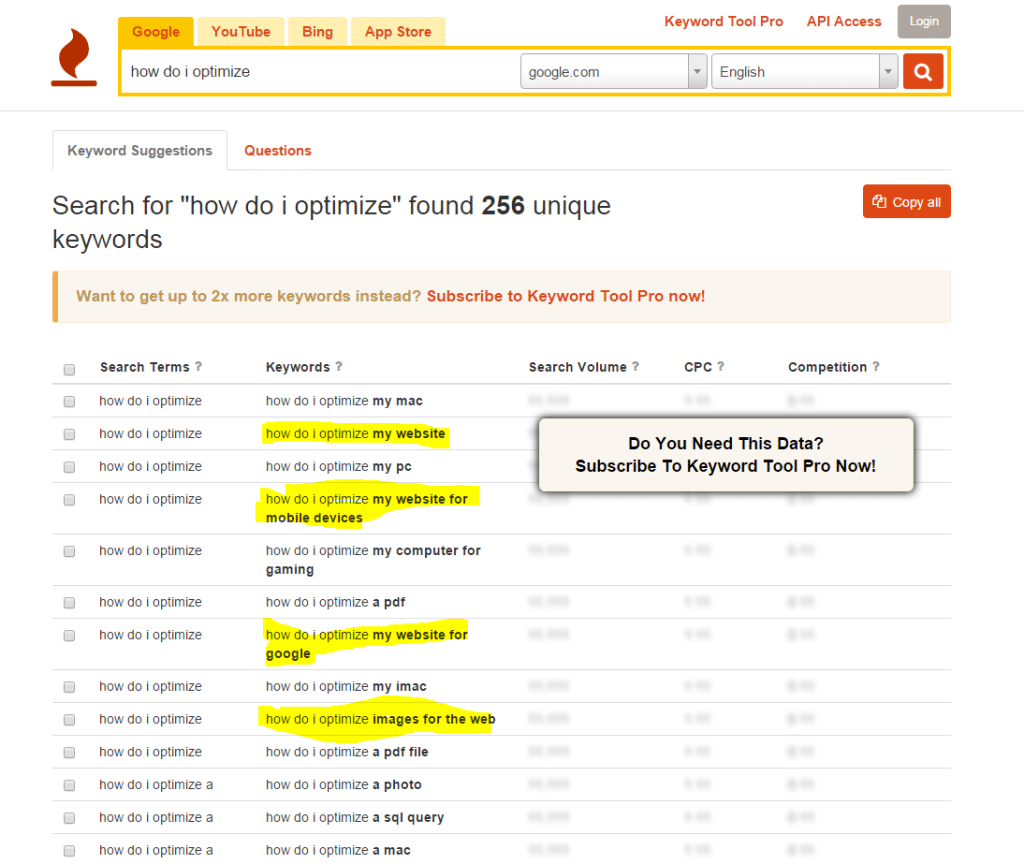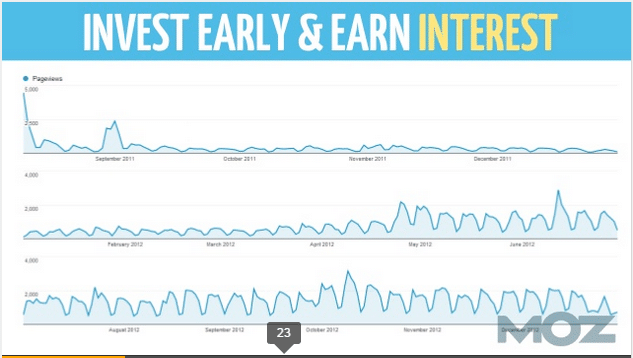
A question we often get asked at Credo is:
“What is the best way to write blog articles to maximize SEO benefit?”
We firmly believe that you don’t have to be an SEO expert to leverage the power of SEO for your site, whether a small business or large corporation. A bit of SEO knowledge can go a long way, especially when you know your audience’s needs and the content that they are interested in. Here are some tips to maximize your SEO benefit for your content and ultimately your company’s bottom line.
Table of Contents
Do Audience and Keyword Research
Before you even start writing content on your site, you need to know the topics that people are talking about and searching for. This is where a bit of basic keyword research can go a long way. The tools you need are:
- Keywordtool.io
- Google Adwords Keyword Tool
- Microsoft Excel or Google Sheets
Now we need to generate ideas. One way to start is to go to Keywordtool.io and plug in the beginning of a phrase that your audience may be searching for. For example, Credo customers may be searching for how to optimize their marketing and business, so by entering “How do I optimize” into Keywordtool.io, I get back a few ideas:

After repeating a few times you’ll have a list of keywords that are targeted to your audience. Now go to the Adwords Keyword Tool and input these keywords, find their search volume, and start writing content around those topics. Also read – The Persona Driven Keyword Research Guide.
Another tactic we have commonly used is to find the online communities around your niche and see what questions people are asking. For example, if you are in the real estate space and have a blog, maybe go to Trulia Voices and see what questions people are asking, then answer those and reply back that you wrote a full post about it.
Then you get links plus a targeted audience plus referral traffic.
Do that often enough and you’ve built not only a nice base of links, but likely also return referral traffic that keeps giving! Here is what a few years of doing this has done for a site we’ve worked on:

Answer People’s Questions
The best way to build your business is to give more than you receive, and that includes sharing your knowledge far and wide. By directly answering the questions that you know your audience is asking, whether via Twitter, Facebook, or on other websites in your niche, you know that you are going to earn traffic that is already searching for what you have – they just do not know it yet!
You can go about this a few ways:
- Write a blog post or two each week around a question that your audience has. If you already have an audience, ask them in emails what questions they have so that you might answer them.
- If your site is big enough, consider creating a forum of your own where people can ask questions and you can showcase your knowledge and expertise by helping them.
Examples of some sites that have done this and leveraged their community, while earning SEO traffic along the way, are Moz, Clarity.fm, and many website forums.
Write The Most Authoritative Piece On The Content
According to this post, the average length of a piece of content that ranks in the top 3 in Google’s search results is over 2,000 words long. It’s difficult to write that much content and not write a complete authoritative piece on the subject, and that is exactly the sort of content that the search engines want to rank highly.
Remember though, it’s not all about length. The search engines likely take into account other factors to assess quality. Therefore we often recommend also including:
- A few relevant images and screenshots
- Lists, because you can communicate so much in a few lines
- Links to other sites, to better help your audience learn
The great thing about the most authoritative piece of content in your niche is that usually even your competitors will send people there. Authoritative content also earns links naturally when you market it (via social, PR, etc) and people share it socially with their friends. Authoritative and helpful content is the gift that keeps on giving. Check out how Moz’s Algorithm History piece of content has done over time:

More examples:
- Beginners Guide To SEO
- The Complete Guide to Google Tag Manager
- The Definitive Guide to Social Media Metrics
- SEMrush guide
Follow Onpage SEO Best Practices
Now that you know what content your audience is looking for, you need to follow some on-page SEO best practices to get the most impact out of your content. Also, don’t forget to have a call to action at the bottom to move them from being just readers to being email subscribers (and eventually paying customers!)
Now to the SEO best practices. By simply including your targeted keyword phrases in the following parts of your content, you will rank better:
- URL (ie domain.com/this-is-my-keyword-phrase/)
- H1 main title (ie This Is My Keyword Phrase)
- H2s and H3s (Why Keyword Phrase Is X)
- A few times through your content
- Keyword phrase as the link text from other content
See? Basic best practice SEO tactics are pretty easy and can go a long ways. If you want to take it to the next level, use a Related Posts plugin to
To do: If you use WordPress, use Yoast SEO. They take care of other SEO tasks for you too, such as adding content to your XML sitemaps to be indexed by the search engines. Other blog platforms usually have SEO best practices baked in as well, though they are less customizable than WordPress.
Share Your Content Far and Wide
Now we get to the fun part of using content for SEO – actually marketing it. You need to get your content in front of the right audiences, and what better way to do that than social media? If you’ve been building your social media audiences, you probably already have a fairly targeted audience. Be sure to share your content across your profiles on all the platforms – Facebook, Twitter, LinkedIn.
A few more ways to make sure your content spreads:
- Email your email list and tell them about it.
- Direct message some friends and ask them to share it.
- Optimize your content for best social sharing (Buffer has a good guide)
Yoast also takes care of the meta content required to make posts look good on social media channels. Here is a Facebook example of a Moz link being shared that looks good because they optimized the images and content.

If you have any experience with paid social amplification, you can also fairly cheaply spread your content to your exact customer persona that you know needs the content you have just produced. If you’re really smart, you can target the content on Twitter to people who work at the online publications where you need coverage.
Write Content on Other Sites
A great way to spread your content and begin building your name as a thought leader in your space is to get some guest posts placed on authoritative websites that already have your audience as well. Jeff Goins, who became a fulltime writer and wrote about it here, wrote over 100 guest posts in his first year investing in his writing. That’s almost 2 per week. That’s a lot of writing, but could you manage one a month?
Guest posting is not only a great way to build some links back to your site, but it’s also a great way to build relationships with others who have an audience that you can share your knowledge with. You could also try to get the site to share the email addresses of people who sign up for their site because of your content. This will help you continue to build your own audience.
So to recap, why guest post?
- Access their audience
- Share your expertise
- Get links back to your site (very important for SEO)
- Bonus points if you’ve written a post around the same topic and can outrank them and capture the email address on your own site
One great tactic to use is to write a blog post around a topic you know, then write a very similar post on another website and link back to your own. This way you could double stack the search results with your own content, rank your content first because it has more links than the other site’s piece of content, and start to dominate that niche.
Keep Writing
Blogging and content take a while to build an audience, but once you do it never goes away. Our founder, John Doherty, wrote on his own personal site twice a week for almost three years. Though he has publish fewer than a dozen posts in the last two years, his site still gets over 3,000 visits from the search results every month.

Good luck!

